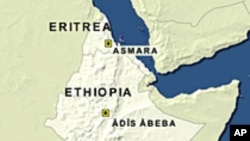Ethiopia has announced a change in its foreign policy to actively advocate the overthrow of the government in neighboring Eritrea.
In a series of interviews during the past week, Ethiopian officials have told of a switch in policy on Eritrea from defensive to proactive.
News agencies quoted Ethiopean Prime Minister Meles Zenawi as telling an Eritrean opposition radio station his government would work in a ‘diplomatic and military capacity’ to oust the regime in Asmara, the Eritrean capital. The reports gave no further details.
Ethiopia earlier accused its archrival of dispatching a team of would-be terrorists to Addis Ababa in January to create havoc during the recent African Union summit. Officials say suspects carrying explosives were intercepted and the plot was broken up.
An Ethiopian spokesman did not have details of the arrests.
Last week, Mr. Meles told a group of English-language journalists his government had uncovered evidence that Eritrea is trying to foment a North-Africa type revolution in Ethiopia.
"We know for sure that, for example, the Eritrean government has given its messenger boys instructions to try. The Eritrean government has decided to turn Addis into Baghdad. That is their latest slogan. That is the instruction they give their messenger boys when they have sent them with bombs and explosives at hand to try and create havoc prior to the AU summit here. Now they are supplementing that instruction with instructions to try and create disturbances, popular uprising and so on," he said.
In an interview Sunday with VOA, Ethiopian Foreign Ministry Spokesman Dina Mufti said the decision to take a tougher stance was made after the international community turned a deaf ear to pleas for more pressure on Eritrea.
"We have been hoping the international community will put pressure on it. However, we do not see that, therefore time has come for us to make sure that our sovereignty is protected and our people, our country, is saved. So these are the situations that have forced us to revisit our position," he said.
Dina said Ethiopia had been forced to take what he called "necessary measures" because the threat from Eritrea had intensified. He did not elaborate.
Eritrea broke away from Ethiopia and won independence after a 30-year struggle in the early 1990s. Meles Zenawi and current Eritrean President Isaias Afewerki were allies in the independence struggle, but later had a falling out, leading to a two-year border war from 1998 to 2000 that killed an estimated 70,000 people.
The neighbors no longer have diplomatic relations.
But Eritrea maintains a diplomatic mission to the African Union, which is headquartered in Addis Ababa. Eritrean ambassador Girma Asmerom declined to comment on the Ethiopian accusations, noting that his portfolio covers only AU affairs. He referred all questions to government spokesmen in Asmara.
Attempts to reach Eritrea by telephone for comment were unsuccessful, but the Asmara government has vociferously denied any attempt to destabilize Ethiopia.
The U.N. Security Council imposed sanctions on Eritrea in 2009 for providing aid to Islamist insurgents in nearby Somalia. The sanctions include an arms embargo, as well as a travel ban and assets freeze against the country’s leadership.
Libya, which was a member of the Security Council at the time, cast the only ‘no’ vote on the sanctions resolution. Eritrea’s U.N. ambassador wrote a letter to the Security Council before the vote calling the charges "ludicrous punitive measures." He said the sanctions risked engulfing the Horn of Africa in another cycle of conflict as it might encourage Ethiopia to contemplate what he called "reckless military adventures."
Ethiopia Advocates Overthrow of Eritrean Government




